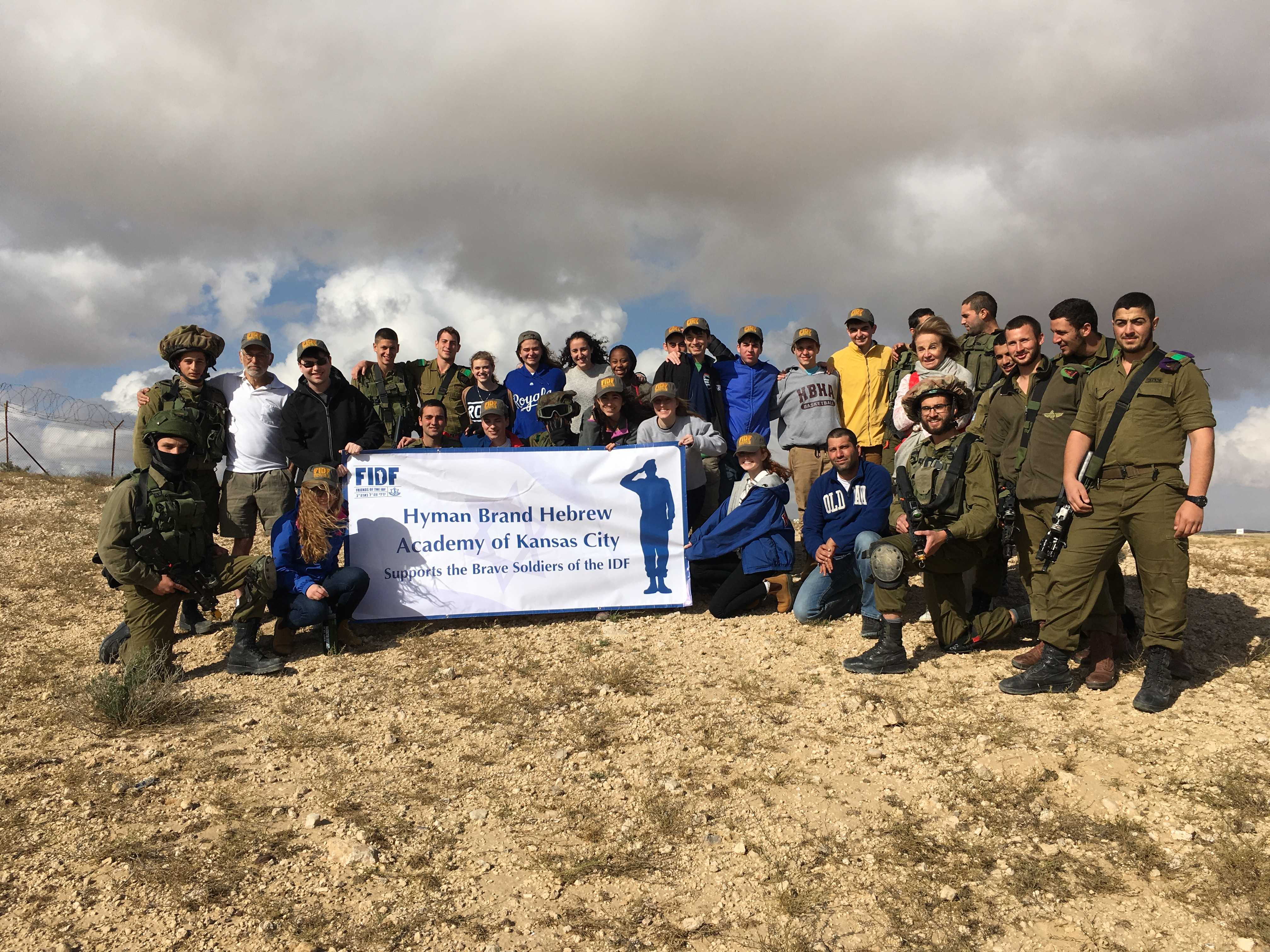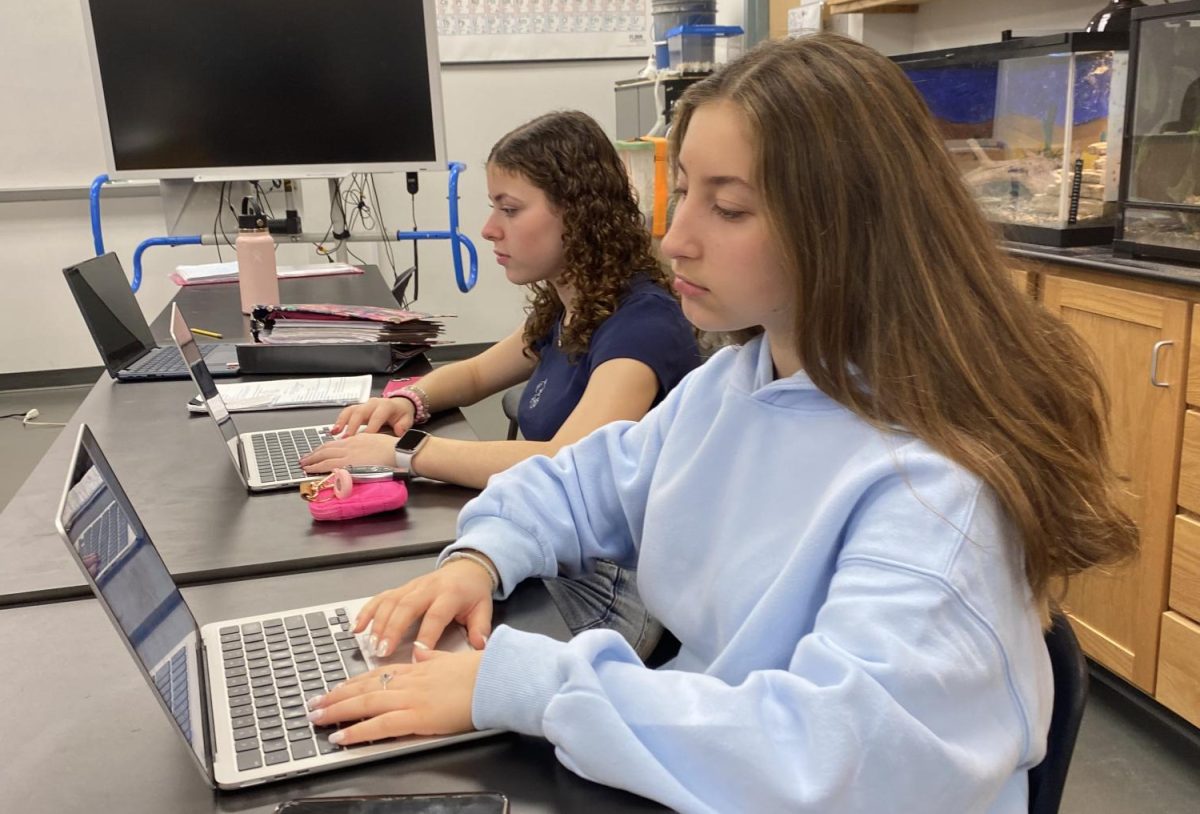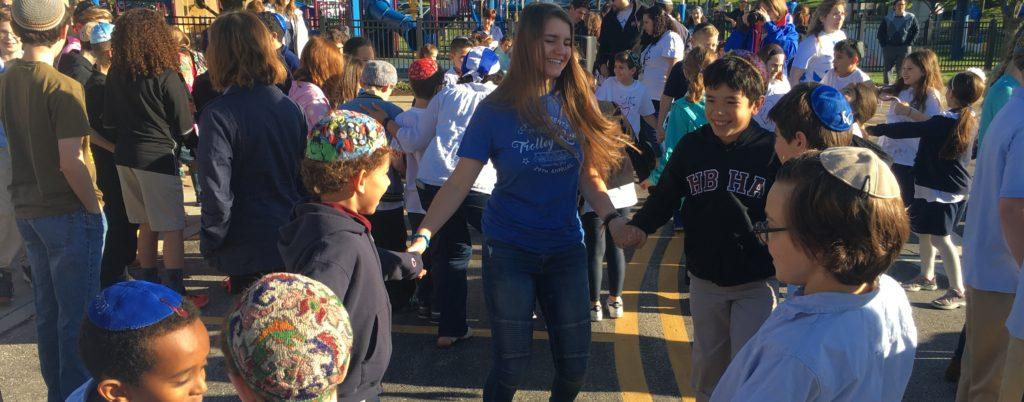[et_pb_section admin_label=”section”]
[et_pb_row admin_label=”row”]
[et_pb_column type=”4_4″][et_pb_text admin_label=”Text”]Featured image by Amanda Sokol.
Article by Haidee Clauer and Leah Sosland.
May 2nd, 2017– Another Yom Ha’Atzmaut (Israeli Independence Day) sweeps through the hallways of HBHA. Underneath strings of Israeli flags covering the ceiling, every student sings and dances to Hebrew anthems flooding the classrooms. Middle schoolers start conga-lines and third graders pause briefly, displaying to commending upperclassmen their handmade festive crafts, Israeli maps, and posters.
Although by now every lyric and beat Yom Ha’Atzmaut could offer feels like second nature to them, HBHA high schoolers still struggle with the nuances of the situation in Israel, especially with regard to Palestine.
At a Jewish day school, the lines between education and advocacy can be blurry when in conversation about the Israeli-Palestinian conflict. In recent years, new programs, more frequent speakers, and daily updates have brought the Israeli-Palestinian conflict more fully into HBHA life. According to the HBHA Mission Statement, the ultimate goal of these initiatives is enabling students to mature “into well-rounded, committed, knowledgeable young adults who are devoted to… the land of Israel.”

This goal, however, is far from simple. Both students and teachers at HBHA grapple with what a connection to the state of Israel could or should look like in an educational setting.
Head of Judaic Studies, Rabbi Avi Weinstein, described the position of HBHA: “[A] Zionist advocate for the state and that the state should thrive,” emphasizing that, “there are different points of view of what that means.”
“My expectation, as Head of School,” expressed Howard Haas, “is that people who graduate from here have an extraordinary love for Israel and knowledge about it.”
Recently, steps towards this goal have actualized in the form of speakers who relate their stories, opinions, and ideas to students. Weinstein maintained that “we engage everyone who is invested in a Jewish state–left, right, or center–[they are] part of the conversation.”
English and math teacher Micah Margolies has noticed that, since he graduated ten years ago, ”there is a more diversified viewpoint that’s presented to students…Especially this year, I feel like there’s been a big emphasis on trying to hear about the conflict from a variety of perspectives…to understand the complexity of the situation, rather than saying: ‘Here is the Jewish view about this,’ because the situation is too complex to pigeon hole in that sense.”
Still, some students worry that this conversation, however inclusive, is unfairly manicured to qualify tendentious opinions.
“We had a Palestinian come and talk to us about what he thought,” described Junior Molly Kavanaugh. “Directly afterwards, there was [a conversation] discounting the person’s opinions when that person wasn’t in the room. I think it would have been more productive if there was more of a debate or at least a conversation with that person, as opposed to just saying: ‘this is why they were wrong.’”
Weinstein, the leader of this conversation following a presentation from Combatants for Peace, explained that he “came in and unpacked it. But I think I was very careful not to refute anything they said, just to say that these things must be seen in a greater context.”
One difficulty present in the inclusion of a spectrum of viewpoints is “the communal pressure,” according to Weinstein. “Since [the students were] very little, they’ve celebrated Yom Ha’atzmaut and have a cultural affinity towards Israel…if we have a controversial speaker come in who you don’t want them to hear from, it’s within the context of a loving relationship with Israel.”
Haas confirmed the tension between communal pressure and bringing in diversified perspectives, describing how “we’re always walking a very thin line…but we can’t keep you in a bubble about the reality of the middle east.”
Science teacher Cody Welton admitted that “we as a faculty probably have never and would never hear a right-of-center approach. In general, this is sort of an inclusive and liberal place…For the more politically right-wing members of the faculty, they realize the kind of environment in which they work. And if they had that much of a problem with it, they’d probably work in a different school.”
Like Welton, Sophomore Jesse Ernstein notices a specific leaning of the student body.
“I know that I’ve heard a lot more negative feedback afterwards when we hear speakers with more of a right wing view–like from somebody who would say we should lean towards fighting for what we think is right, versus leaning towards peace,” shared Ernstein.
“When the school does address the conflict, it tries to thread that needle and I think it does an okay job. My impression is that we don’t talk a lot about it,” said Welton, adding that “even though that subject is not addressed super explicitly in the curriculum, I think most of our students have a healthy sort of value from their own families and experiences.” Still, Welton believes “it should have a place in the curriculum. This is an issue you’re going to have to deal with and at least entertain peoples’ opinions about.”
When asked why there is no allocated slot for the Israeli-Palestinian conflict in the current HBHA curriculum, Weinstein shared, “we are right now revamping Jewish history in the curriculum. For next year, we really want to give it its own identity, as opposed to it being sandwiched in to general history.”
Although there is no specific class dedicated to Israeli and Israeli-Palestinian history or current events, high school students take approximately five minutes before reciting the Prayer for the State of Israel to listen to Zohar Flacks’ daily “Israel Update.”
According to Sophomore Sara Saidel, these short sessions “are really good. She doesn’t do it from a completely Zionist way. She tells it how it is, even when Israel does things we don’t agree with. She doesn’t try to shield us from the truth.”
Kavanaugh concurs, saying “Zohar, at least, makes an effort to give an unbiased opinion and just give facts. I know it’s impossible to do that completely, but she does her best.”
There is always a fine line, especially in a school with such close student-teacher relationships, between education and stipulation. “Some teachers are more open, but some teachers sort of try to force an opinion onto you,” said Ernstein.
Another student, who wished to remain anonymous, compared her experience learning Israeli history with American history. “The US history classes I’ve taken are great at maintaining objectivity. They challenge you to think critically for yourself, rather than think a certain way. At the very beginning of the year, we even read The Twin Towers of Lebanon, a letter by Osama Bin Laden, and no one came in afterwards and refuted his points. As students, we were able to have an incredible conversation about it by ourselves, and it’s kind of crazy that when it comes to Israeli history, we might be force-fed these qualifications if someone’s opinion is even a little bit controversial.”
Though some students worry about a fluctuating level of objectivity, Haas and Weinstein agree that it is not their own place, “nor is it your teachers,” added Weinstein, to advocate their personal beliefs to students.
With this goal of objectivity in mind, administrators face the daunting task of maintaining a program that is not only engaging and accessible, but transparent and open-minded as well as they redesign the Jewish history curriculum–one that students and teachers alike hope will continue to comprise an atmosphere conducive to healthy, educated engagement regarding the Israeli-Palestinian conflict in the Middle East.[/et_pb_text][/et_pb_column]
[/et_pb_row]
[/et_pb_section]















































































